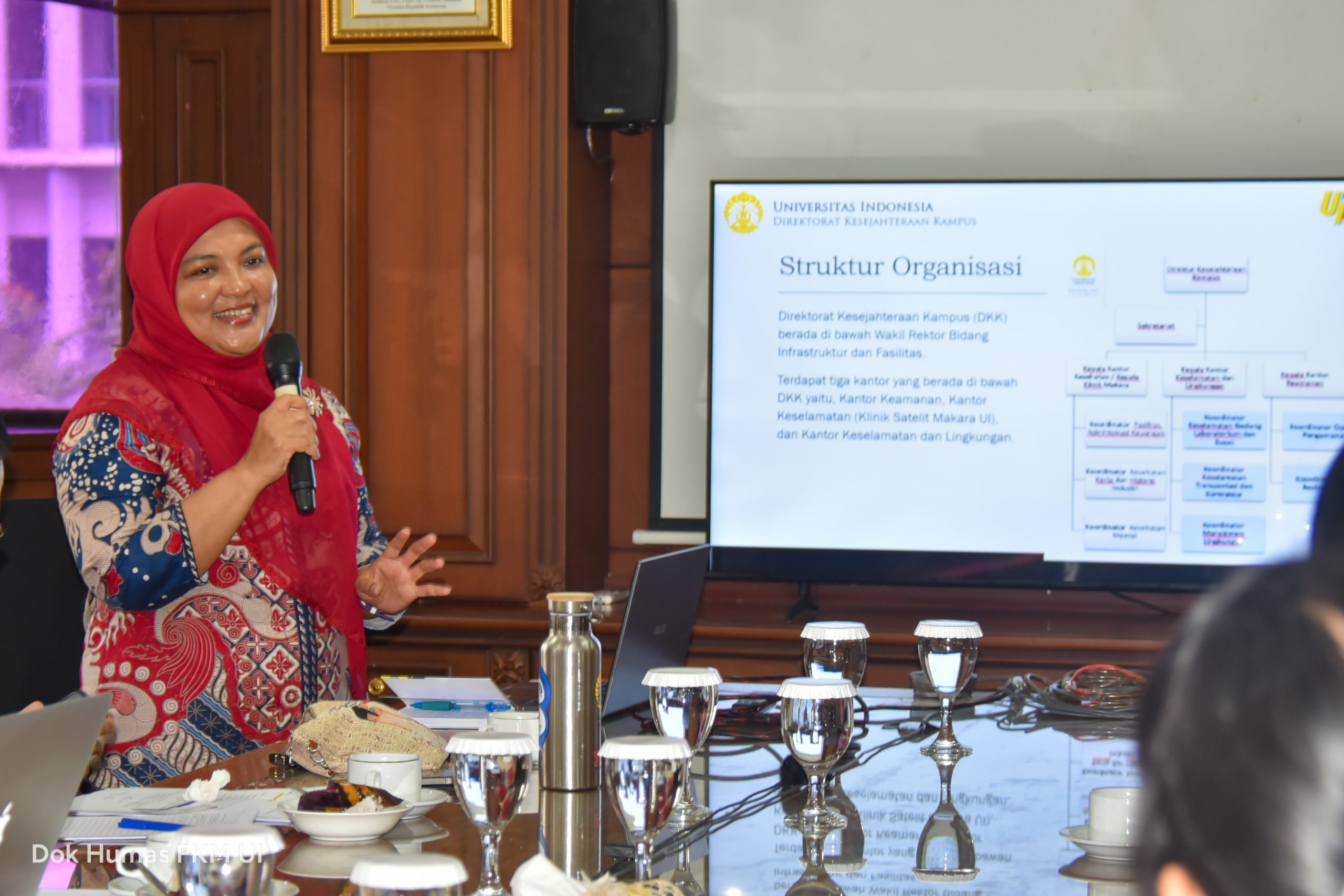Depok, October 28, 2025 – The Faculty of Public Health (FPH) Universitas Indonesia (UI) was selected as one of the higher education institutions to host the Research Visit on the Landscape of Disability Inclusion in Indonesian Higher Education Institutions. This visit was part of a collaborative research project titled The Landscape of Disability-Inclusion in Higher Education Institutions in Indonesia, initiated by the i-DEA Hub (Indonesia Disability-Inclusion for Education and Accessibility)—a partnership between Telkom University and Lancaster University, UK—supported by the British Council through the UK–Indonesia Disability Inclusion Partnerships Grant program.
The visit, held in Meeting Room B206A, aimed to identify and map best practices, challenges, and opportunities for advancing disability inclusion services in Indonesian higher education. The research does not intend to assess or rank universities but rather to present an objective portrait of current efforts and realities in realizing inclusive and equitable higher education. In line with the spirit of the Sustainable Development Goals (SDGs), particularly Goals 4 (Quality Education), 10 (Reduced Inequalities), and 17 (Partnerships for the Goals), the visit to FPH UI reflects the faculty’s strong commitment to fostering an inclusive academic environment that supports vulnerable groups, including persons with disabilities.
The activity at the UI Depok campus was attended by representatives from the i-DEA Hub team, the National Commission on Disability (KND), as well as UI leadership and academic community members, with FPH UI serving as the host. The program included an opening and welcoming session, an introduction to the research survey instrument, a Focus Group Discussion (FGD) with lecturers and staff, interviews with students with disabilities, and a campus accessibility and facilities walkthrough.
In her remarks, the Director of Campus Welfare and Head of the Safety Office of Universitas Indonesia, Mila Tejamaya, S.Si., MOHS., Ph.D., presented the development of disability services at UI from the pre-pandemic period through the post-pandemic era in 2025. She explained that UI continues to strengthen its policies and systems to support students and staff with disabilities. “Even before the pandemic, UI had undergone a major transformation in disability services. Now, post-pandemic, UI reaffirms its position as an inclusive campus,” she said. Dr. Tejamaya also highlighted the active contribution of various faculties at UI, including FPH UI, in developing facilities accessible to vulnerable groups. “FPH UI was even the first faculty in Indonesia to receive an award from the Ministry of Administrative and Bureaucratic Reform (KemenPAN-RB) as the best Public Service Unit (UPP) providing disability-friendly public service infrastructure,” she added.
Meanwhile, the Vice Dean for Education, Research, and Student Affairs of FPH UI, Dr. Milla Herdayati, S.K.M., M.Si., emphasized that the award serves as concrete proof of the faculty’s commitment to creating a safe, comfortable, and equitable learning environment for all members of the academic community. “FPH UI has prepared various facilities that support both academic and non-academic activities for students with special needs, including physical accessibility, learning support tools, and disability-friendly counseling services,” she explained.
From the student support perspective, Riza from the Vocation Wellness Center, Vocational Education Program of UI, shared insights on providing education and ongoing services for the disability community. She explained that every activity organized by the center always involves students to foster continuous awareness and empathy toward disability issues within the campus environment.
Eka Prastama Widiyanta, Commissioner of the National Commission on Disability (KND), also expressed appreciation for UI’s systematic efforts to realize inclusive higher education services. “We are not only monitoring but also learning from the good practices of universities like UI. Many people with disabilities in Indonesia still lack access to higher education due to limited supporting facilities. We hope UI continues to be recognized as an inclusive university and a national model,” said Eka.
During the discussion session, Prof. Frieda Mangunsong, a senior professor at UI, shared her views on the development of Universal Design for Learning (UDL) on campus. She noted that UI has received several research grants to advance disability services and project-based learning initiatives. “This approach benefits not only students with disabilities but also all students with different learning styles, allowing their potential to develop equally,” she said.
The research team from Telkom University, as the main partner of the i-DEA Hub, explained that the visit aimed to collect field data through observation, interviews, and discussions with key stakeholders in higher education. The findings will serve as the basis for evidence-based policy recommendations to advance inclusive practices in Indonesian universities. The visit concluded with a Focus Group Discussion (FGD) that explored challenges and strategies for building inclusive campuses. One of the main issues raised was the limited human and financial resources, which remain common challenges for universities in sustaining inclusion programs.
FPH UI’s participation in this national research initiative underscores its pioneering role in advancing inclusive education policies and practices. Through collaboration with multiple partners, FPH UI remains committed to strengthening its facilities, policies, and academic culture that embrace diversity and ensure equal opportunities for all. “We believe that inclusivity is not merely a policy, but a value that must live within every academic and social activity on campus,” concluded Dr. Milla Herdayati. (wrk)

